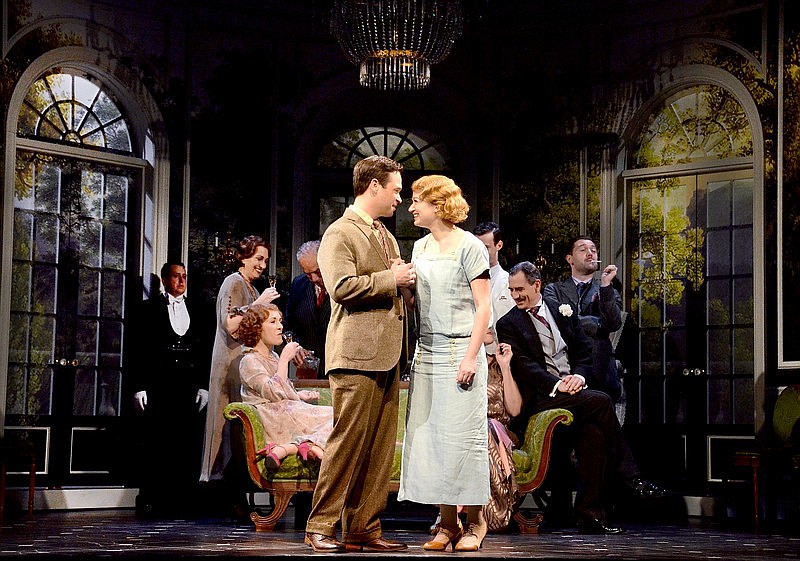- December 26, 2024
-
-
Loading

Loading

W. Somerset Maugham was clearly great fun at parties. And he was clearly paying attention. The evidence being “Our Betters,” the latest offering at the Asolo Rep. Maugham’s 1923 play masterfully distills his observations of upper class England at the dawn of the Roaring Twenties.
The result is a fractured fairy tale.
Imagine Cinderella as an expatriate American with enough cash to buy diamond slippers and Prince Charming as a broke Brit with land and titles. Now picture the two in a loveless marriage of convenience. It’s a fact-based fantasy. Back in the 1920s, such marriages filled the social pages. They fill Maugham’s play in various stages of formation, stability and decay.
The family plot? Bessie (Allie Henkel) an innocent American heiress/ ingénue, is hanging out in London with her not-so-innocent expatriate sister, Pearl (Katie Cunningham), who more closely resembles Iago’s meaner sister. Pearl is no lady, but she’s a Lady, having married the never-seen Lord George Grayston. Pearl’s life is an endless party—a party paid for, not by the bankrupt Lord, but by Fenwick, her well-heeled American sugar daddy (Jonathan Epstein). Pearl schemes for Bessie to follow her example and marry Lord Bleane (Matt Andersen), a toff with the personality of a tennis racket. Heeding Pearl’s advice, Bessie’s ended her engagement to her childhood sweetheart, a straight-arrow American named Fleming (Buddy Haardt). She’s made her choice, or has she? Second thoughts emerge. Buyer’s remorse. Will Bessie marry Fleming or the tennis racket — sorry — Lord Beane?
There’s more to it — a complicated flow chart of gigolos, parasites and poseurs, money, marriages, divorces, and secondary and tertiary affairs. But Bessie’s the heart of the story. Will she marry a Lord she doesn’t love or return to America with her childhood flame? Real love or fake nobility? That is the question. If Evelyn Waugh were writing, the story it might end badly …
But the story’s not the whole story. The world on stage is: Britain’s lost Eden of upper-crusty creature comforts and class distinction. To contemporary anglophiles, “Our Betters” is a golden ticket to Willy Wonka’s Chocolate Factory. They pack the opening night audience, so my spider sense tells me.
Said anglophiles oooh and ahhh at first sight of Lee Savage’s sumptuous set design: a gilded hall of mirrors painted with a woman’s giant, pretty face set in cold, modernist disdain. (A fine image for this empty, painted world.) More joy ensues at the revelation of Tracy Dorman’s spot-on period costumes. When the play actually starts (under Michael Donald Edwards’ deft, “Masterpiece Theatre” style of direction), their joy is uncontained.
The source of all that joy feels more like a character study than a tightly plotted dramatic arc. Maugham wanders — the second act feels like a series of one-liners in the mouths of his various characters. Most are rotten to the core. But they’re all entertaining — and brilliantly acted by the fine repertory cast.
Cunningham’s Pearl is a scene stealer. (But that fits. “Pay attention to me!” is her character’s heart’s cry.) Pearl, that Machiavellian miscreant, seems winning — until you realize she’s heartless, manipulative, narcissistic and cold. (And those are her good points.) Unlike Iago, Pearl doesn’t use her guile to strangle a noble Moor. She merely wants parties, money and affairs. (What Pearl wants, Pearl gets.) Henkel’s Bessie is the semi-innocent, American abroad. She knows this shining, privileged world is all vanity, vanity—but vanity’s fun. Haardt’s jilted Fleming is the only decent fellow. (“I only want what’s best for you, Bessie.” Etc.) Nice guys are hard to play, but Haardt pulls it off with heart. Andersen embodies (or disembodies) the semi-distracted Bleane, remember him? He’s the Lordling that Bessie’s engaged to and Pearl snogs in the gazebo … I think. (Look, I try to keep up, but a chart really would’ve come in handy.) Anne-Marie Cusson is a hoot as the 40-something Duchesse de Surennes, who’s squandering her family fortune to keep a pouting boytoy, Tony, (Ben Diskant — who’s also hilarious). Epstein’s fat cat Fenwick has depth — my hunch is, more than the playwright intended. On the page, Thornton Clay (an expatriate Virginian) is a jester in a bespoke suit. Tom Coiner plays him like Tennessee Williams with a time machine. Very funny. But the comedy crown goes to David Breitbarth’s walk-on as Ernest, a legendary dance master and Great Britain’s party king. He’s a whispered-of eminence who never shows up. But, right before final curtain, he actually does! To Britain’s upper crust party set, it’s like the coming of the Messiah.
A lovely bunch of cocoanuts, eh? The only thing missing is Groucho.
Hey, if you’d attended Britain’s best parties, studied the worst people and took notes, you might come up with a cast of characters like that. Maugham did. Upper class Yanks and Brits behaving badly! He came, he saw. And he put it on stage.
Our nation’s insecure elite. And Great Britain’s.
Yes, thanks to Maugham’s comedy of bad manners, you can crash their exclusive parties and laugh with them and at them. Laugh you will, make no mistake. “Our Betters” is a very funny play. So funny, it’s easy to miss the point — especially if you’re an anglophile with a Golden Ticket in your chocolaty hands.
The play’s outrageous laughter tends to obscure Maugham’s outrage. To spell it out? America’s shameless nouveau riche are social climbers; Britain’s shameless aristocrats are selling England by the pound. It’s the world’s oldest profession on the one hand, the world’s oldest customer on the other. Shame, shame.
As Lady Grantham might put it …
That’s the moral, you see. Do endeavor to restrain your laughter, if only momentarily. It might possibly set in.